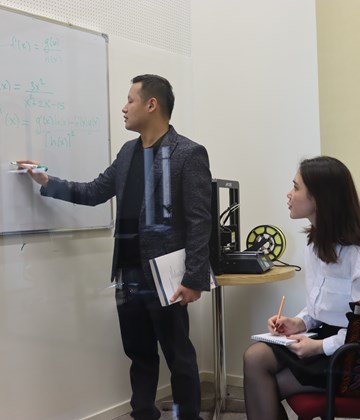
Freshman

Sophomore

Junior

Khorog campus, Tajikistan
5 years (1 year preparatory programme + 4 years bachelor's degree)
Curriculum developed in partnership with the National Research University’s Higher School of Economics and Stockholm School of Economics
The Global Economics major at UCA provides a broad education designed to understand and seek solutions to contemporary economic, financial, environmental, and social challenges facing the world. Given UCA’s unique location, the programme not only gives students a strong understanding of global economic ideas, but it also focuses on the real challenges and opportunities of mountain communities in Central Asia. This makes it especially relevant for students who care about development, sustainability, and making a difference in their region.

The programme provides a strong foundation in both theoretical and applied aspects of economics, empowering students to use their knowledge to evaluate a variety of economic and social phenomenon to make informed personal, business, and policy choices. Programme requirements include a core set of courses in economic theory, supplemented by mathematics, data analysis, and statistics. Additional requirements include courses in a number of economic sub-fields relevant to the development mission of the university. Elective courses allow students the flexibility to develop a programme of study that is tailored to their individual needs and interests, such as in business, entrepreneurship, environment, and public policy. Students are also encouraged to incorporate courses from other UCA programmes as electives for a well-rounded educational experience.
Graduates of Global Economics are in high demand because of increasing public concerns related to the environment and resource use, and the importance of economics and management in global affairs. The programme’s low faculty-student ratio and hands-on learning allow students to gain the confidence and experience needed to compete in the job market or go on to graduate studies.
Explain complex economic and social phenomena through models and theory.
Analyse qualitative and quantitative data to describe relationships between economic variables.
Apply economic arguments to discuss policy proposals, especially in the context of Central Asian economies.
Assess development challenges relevant to mountain communities by asking researchable questions and providing evidence for possible policy interventions.
Use economic concepts such as equilibrium, agent theory, or transaction costs to explain issues.
Evaluate the limits of prevailing economic theory and various policy choices using appropriate methods and tools.
Communicate the implications of economic ideas, concepts, and policies to economists, decision-makers, and the public.
Identify the factors determining organizational and institutional performance, including capital, labour, and technology inter-relationships.
Communicate and evaluate the implications of economic concepts and policy decisions for Central Asian economies and beyond.



The Global Economics programme at UCA is designed to prepare students for a range of successful careers especially those in the development sector. This includes careers in government, private firms, non-profit and international organisations in fields as diverse as public policy, environmental economics, agribusiness, ecological management, and international relations.
Courses offered at UCA in entrepreneurship, management and finance give enterprising and resourceful students the tools to start their own businesses and contribute to the development of the regional economy. Finally, the programme prepares graduates to enter top-ranked graduate and professional schools to pursue research and academic careers. Graduates may continue their education in fields such as law, business administration, health, economic development, social work, consumer advocacy, and natural resource management.
Humanities, social and natural sciences as mandated by the Ministry of Education.
Economics, Math, and Statistics courses.
Electives from Economics and other majors.
Hands-on training opportunities in professional settings.
Final thesis and state examination.




I will forever cherish my time at the UCA. It not only strengthened my academic and professional life, but also helped me find meaning and direction. In the safe and supportive environment of the UCA, I was able to open my mind to new ideas and see the world from a broader perspective. The university equipped me with valuable skills and gave me the ambition to work in the development sector and contribute to the betterment of my community. UCA helped me discover who I want to be and the impact I want to create.
My journey from UCA to my MBA in Canada was shaped by both the classroom and the community. Studying Economics with our wonderful professors gave me a strong analytical foundation. Outside of class, co-founding the UCA MUN Club taught me hands-on leadership. Living in the unique and beautiful culture of Khorog, similar to my hometown, taught me the value of community and connection. This powerful combination at UCA prepared me perfectly for my master's degree and my future career.
My time at the UCA definitely impacted me both academically and personally. UCA's Global Economics programme offered diverse areas of economics, which helped me to understand where to focus further in life. Moreover, my UCA research experience helped me throughout my master’s degree, culminating in the Best Thesis Award. In my current work environment, I use the statistical tools for data analytics taught to me at the UCA. Overall, my post-UCA life was largely shaped by what I have learnt on campus and it impacted my subsequent choices and achievements.

Applications are open for UCA's undergraduate programmes:
- BSc in Computer Science (offered in Naryn, Kyrgyzstan)
- BA in Communications and Media (offered in Naryn, Kyrgyzstan)
- BSc in Earth and Environmental Sciences (offered in Khorog, Tajikistan)
- BA in Global Economics (offered in Khorog, Tajikistan)
All programmes are taught in English and follow an international curriculum emphasizing analytical thinking, research, and community engagement. UCA students benefit from small class sizes, personalised academic support, and extensive internship and career development opportunities.
Application deadline: 14 February 2026